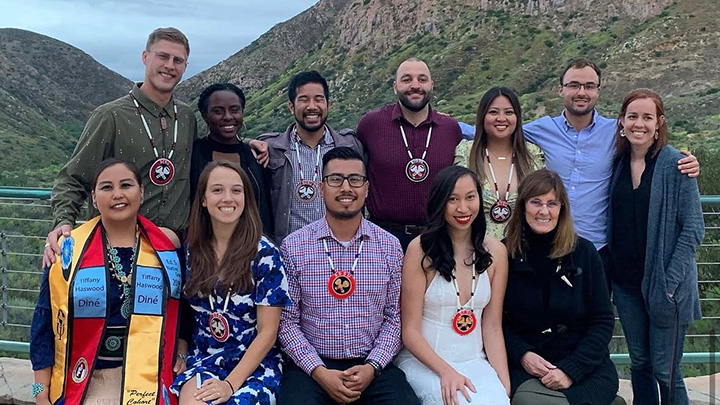HARMONY furthers SDSU’s work to support Indigenous youth wellness
Building on three decades of partnerships, a new federal grant supports training school counselors and psychologists to work in tribal communities.

For 30 years, San Diego State University has joined tribal communities and schools that serve them to prepare practitioners to work with Native American and other Indigenous youth and families. A new federal grant has ensured that legacy will continue for years to come.
In October, the U.S. Department of Education’s Office of Special Education and Rehabilitative Services awarded $1.25 million to fund HARMONY, a project aiming to address the paucity of school counselors and school psychologists appropriately trained to work with Indigenous students served in special education or those at risk of misidentification.
Project principal investigator Carol Robinson-Zañartu has been at the forefront of this work since its infancy the 1990s. Now a professor emerita in the SDSU Department of Counseling and School Psychology, she’s putting retirement on hold to launch HARMONY alongside Brittany N. Glover, assistant professor of school counseling.
“We've learned to be, I think, very cognizant of the effects of colonization and historical trauma while at the same time really wanting to validate the strengths of the community and the kids,” Robinson-Zañartu said. “The Indigenous worldviews are fascinating and complex ways of thinking. We want to honor that.”
HARMONY’s funding will support 12 graduate-level scholars over the five years of the grant. This is the most individual support the initiative has ever received from the Department of Education, covering students’ tuition while providing additional monthly stipends to offset the cost of living expenses, support for home immersions, assistive devices, technology and for conference attendance.
Their work will take place in the rural North San Diego County community of Bonsall with members and parents from the Pala community as well as with the staff of Bonsall High School and Vivian Banks Charter School.
“We’ve been up there for a couple of years and are in the slow process of building trust and relationships,” Robinson-Zañartu said.
She added that Starr GreenSky ('24) and Bryanna Kinlicheene ('24), two Indigenous alumni who are now school psychologists in schools serving Pala youth, helped pave the way for those efforts. Both have returned as instructors and supervisors on HARMONY along with fellow Ed.S. in school psychology alumna Ann Huynh (’21). The three alumni were involved in the latest grant from the planning stages.
“The project that I was in through my graduate program really helped bridge school psychology and that special education side with who I am as a person,” said Kinlicheene, who is from the Diné Tábąąhá clan. “That really made my learning more meaningful, so doing that with other kids now is what I will strive to continue to do.”
Special education
Glover’s inclusion is particularly important given her background expertise in special education settings, alongside her school counseling expertise. A licensed clinical mental health counselor, her expertise includes training special educators and practitioners to support students with emotional and behavior disabilities.
“The collaboration piece (of the project) to me is so underrated,” Glover said. “School counselors and school psychologists truly need to be able to work together collaboratively, not only because there's so much work that we do that overlaps, but there are skill sets that each of us has individually that can be very beneficial to ensuring that we're helping kids the way that we need to.”
Nationwide, Indigenous youth are overrepresented in special education and are at high risk of misidentification. HARMONY attempts to put those stark realities into historical and cultural context for the scholars.
Graduate student participants learn about a wide range of legal and ethical issues impacting Indigenous communities, including Title VII of the Elementary and Secondary Education Act (ESEA) and the Indian Child Welfare Act (ICWA), as well as the effect of colonization on education. They will also study Indigenous histories, educational histories, government policies, culturally responsive interventions and culturally affirmative assessments.
Scholars will also participate in workshops from the National Native Children's Trauma Center and study the local Cupeño tribe’s history of resilience and resistance.
“We find that digging into those realities really provides a lot of critical background for working with the kids, some of whom know quite a bit about their own histories, and some who are learning,” Robinson-Zañartu said.
It will no doubt be a personal exploration for many of the scholars too. Robinson-Zañartu says that over the years of work in tribal communities, “dozens and dozens” of participating students have been Indigenous themselves.
“We have a lot of graduates who have gone back to their tribal communities and made a difference,” Robinson-Zañartu said. “We have made a difference in terms of school psychology nationally, starting a Indigenous American work group in the National Association of School Psychologists. Our long-term impact, I think, has been really powerful.”
On HARMONY, participating Indigenous scholars from around the country will receive opportunities to return to their home communities for immersions in which they will deepen their own ties, connections and relationships.
“So many of the students that were participants shared with me how amazing it was to be able to go to where their Indigenous roots are,” Glover said. “They learn about who they are, who their ancestors are, their people. I think that's just amazing.”
Recruiting for HARMONY is underway. To learn more, visit the website, follow on Instagram or contact Carol Robinson-Zañartu at [email protected] or Brittany N. Glover at [email protected].



